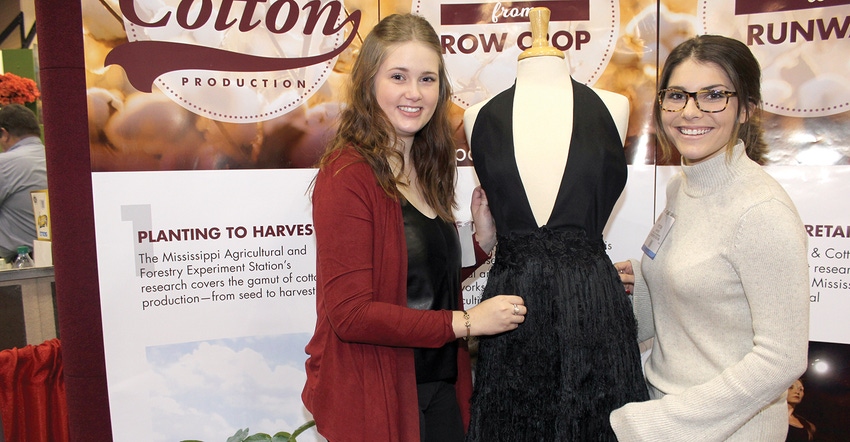
Cotton producers in the Delta may not know about an invaluable ally they have in their corner with broad influence that expands with every graduation commencement at Mississippi State University.
Housed under the School of Human Sciences, the Center for Retail Cotton Product Development (CRCPD) was launched in 2014 to bridge connections between apparel brands, retailers, supply chain partners, and MSU. Building and maintaining that value and the viability of those connections is accomplished in part through the department’s Fashion Design and Merchandising (FDM) major.
At the helm of the FDM concentration is Dr. Charles Freeman, assistant professor. At one time a custom tailor, Freeman holds an undergraduate degree in Textiles and Consumer Sciences, a master’s degree in Creative Design, and a doctorate in Human Ecology.
“Fashion plays a large role in how we view ourselves and others,” says Freeman. “The Mississippi Delta produces excellent cotton, and through the FDM program, we are working to educate both consumers and retailers on the advantages of wearing and working with cotton over synthetics.”

MSU Freshman Madison Glusenkamp, a member of the Fashion Board Club, models a cotton-rich denim outfit during the club's 2017 fashion event - Renegad.
FDM is one of the fastest growing majors at MSU. “There are only a few programs like ours across the country, and it is the only four-year program of its type in Mississippi,” explains Freeman. “We currently have 140 undergraduate students and that number increases with each registration period.”
The major is so specialized it attracts students from all over the United States. “This program is all about finding various ways to bring cotton and retail together,” says senior Monica Tayler from Toledo, Ohio. “Those unaware of the FDM program think just because these students are in fashion, they know nothing about agriculture. Nothing could be further from the truth.”
RESEARCH
The founding of the CRCPD has allowed the focus of the program to shift and expand student involvement in research activities, and connect their career goals in the fashion industry with myriad of supply chain partners. Peyton Shaffer, a senior from Biloxi, Miss., illustrates the diversity in goals the program allows students to have.
“I love fashion design, and this program has given me an extremely broad knowledge base of so much more than just fashion,” says Schaffer. “I want to take what I’ve learned and build on it with a law degree and become an attorney for a design company.”
FDM education efforts impact farmers and retailers. Freeman often gets requests from outside the university to conduct research on various topics.
“One recent request asked the students to delve into research that would shed light on the impact the Better Cotton Initiative (BCI) is having on cotton farmers in our state,” says Taylor. “It’s a very complex subject, but findings from our research efforts clearly show BCI is having a negative impact on U.S. cotton. Our cotton producers have been meeting or exceeding BCI requirements for years, and the costs they require for membership are the last thing our growers need when their farming margins are already so tight.”
SUSTAINABILITY, ORGANICS
Another student-centric project provided important insight into consumer views on subjects like sustainability and organics.
One project currently being conducted is cooperatively funded by the CRCPD, Cotton Incorporated, and MSU’s School of Chemical Engineering. “We are working to create a bio-polymer from cottonseed oil that is 100 percent biodegradable,” explains Freeman.
The multi-group effort has led to the creation of a cottonseed oil-based fiber that is stable enough to actually allow the team of researchers to conduct electro-spinning tests, create nonwovens products, and, hopefully, over the next two years, conduct some fiber extrusion trials. “The polymer has zero styrene and no external chemicals,” says Freeman. “We’re hoping it leads to a fiber product that could one day replace polyester.”
On a more academic or professor level, Freeman and his cooperators are looking toward patenting some new products they hope to commercialize that will increase demand for and market value of gin trash. “It involves replacing wood pulp in the manufacturing of construction materials, but I can’t say much more than that right now,” says Freeman.
Freeman, his students, and the CRCPD are breaking new agricultural ground for U.S. cotton, and they are doing it without a tractor or a plow.
About the Author(s)
You May Also Like




